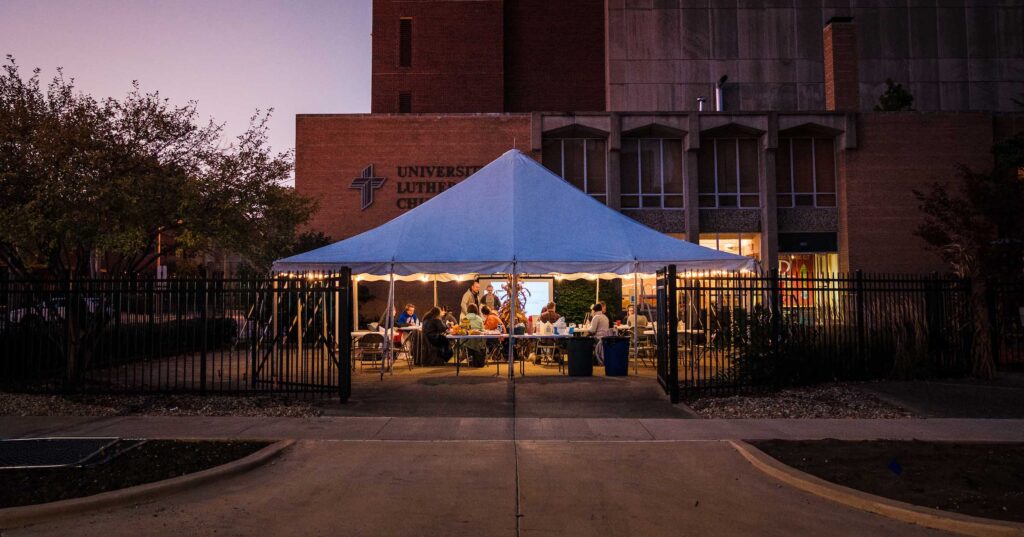Welcome to the college phase of life! Maybe you’re starting to check out schools. Or you’re filling out applications; getting acceptance (or rejection) letters; choosing which school to attend; packing up and moving into the dorm; struggling to get up for that Monday morning class; slaving away at the final paper; walking across the stage at commencement.
This college phase of life can be exciting, anxiety-inducing, nail-biting, embarrassing-because-mom-keeps-crying, etc. But here’s the thing: It’s a phase. The whole college experience is, for most, a span of just a handful of years. There’s a part of your life that is college-related, and likely a whole lot that is not. It’s here, and then it’s gone, regardless of how much the school’s social media team tries to make it seem like you’ll always be part of the school.
Here is what is not a phase: Your Baptism into Christ. You will always be a part of His family. His forgiveness, life and salvation are always yours by grace through faith. Your life in Christ goes on forever. There’s no point in your life where God intends for you not to be part of His church, gathering to hear His promise of salvation and to receive Christ’s body and blood in the Lord’s Supper.
Here is what is not a phase: Your life-long confession that “Jesus is Lord.” Throughout your years you say “Amen” to all the teachings, promises and comfort of Jesus that He tells us in the Bible, the Holy Scriptures. Jesus says, “Be faithful unto death, and I will give you the crown of life” (Rev. 2:10). This is a tremendous exhortation and promise of Jesus. But it also means that you are called by God to faithfully keep God’s promises in your ears, and your confession of Jesus as Savior and Lord on your lips.
The college phase
In your college phase of life — looking for a school, applying, preparing to go and attending — you are called by God to make sure that you can keep attending a faithful Lutheran church. God calls you to this because He wants you to remain a Christian beyond college and throughout all the phases of your life.
When you’re looking for and applying to schools, you have a list of things you’re looking for: smart professors who aren’t mind-numbingly boring, opportunities to turn your degree into a good job, exciting sports teams, a great music scene, awesome restaurants, a campus that is easy to get around, a location that is warm (or cold) in the winter, great student organizations and on and on. At the top of the list, though, needs to be this: There is a faithful Lutheran church or campus ministry active on campus or near the school.
If you’re just about to head off to school for freshman orientation, or you’re moving into the upper-class ranks, you need to have a faithful Lutheran church or campus ministry to attend. Maybe that has not been a priority for you. It’s time to make it one. God tells us in the Bible that we should not neglect to meet together (Heb. 10:24–25).
Finding a faithful church
How do you find a faithful Lutheran church or campus ministry near your school? The LCMS has a couple very helpful resources online to start with. The LCMSU Chapter Map has a list of all the registered LCMSU chapters in the U.S. (Yep, there’s one in Hawaii!) There’s also the LCMS Church Locator that will help you find any LCMS congregation in a particular place. Ask your pastor or another church worker to help you. He or she will be glad to help you find a place where you can be cared for with Christ’s forgiveness in Word and Sacrament while attending college.
How do you know what is or isn’t a faithful Lutheran church or campus ministry? What does this look like? I find the brief summary of the church in the Augsburg Confession to be helpful in getting started. “The Church is the congregation of saints in which the Gospel is purely taught and the Sacraments are correctly administered” (AC VII). Here’s what that looks like in practice, at minimum:
- They have a service each week where you can hear Christ through the pastor promise the forgiveness of your sin, in sermon and in Supper. “The one who hears you hears me” (Luke 10:16).
- There are opportunities to study the Holy Scriptures, learning what God has done for you and how He would have you live. “Your word is a lamp to my feet and a light to my path” (Psalm 119:105).
- The pastor or leader is available for you to talk with during the week, when inevitably come the questions or challenges raised by campus life.
A final word
One more word of advice. There are other non-Lutheran, though Christian, groups and ministries doing work on and around the college campus. You will probably come across their booths at the Resource Fair or be invited to attend by a Christian friend you’ve met. Caution should always be taken when attending. Some other Christians have quite different teachings about the comfort of Holy Baptism, the gift of the Lord’s Supper, or even about the depths of the sinfulness of man and how we are given faith in Jesus. Here’s a rule of thumb: Always make sure you’re first attending the weekly Lutheran Divine Service and a weekly Lutheran Bible study before you meet with a different Christian group. And always talk with your pastor back home and the campus pastor or leader about it.
By the way, all these tips? They are just as handy when you’re getting to the end of that college phase of life, and you are looking for a job. Even then, at the top of the job search list should be a place where there’s a faithful Lutheran church for you to attend.
Photo: LCMS Communications/Erik M. Lunsford




To those preparing to enter college I might say this:
Continue to trust God’s Word as a sure foundation for your faith and life.
Always remember that salvation is a gift received by faith, not something that you acquire if you’re good enough.
But understand that God’s abundant mercy is not license for you to do as you please. Rather, count yourself dead to sin (Rom. 6:11). (Justification comes freely but sanctification has a cost.)
And aspire to fulfill the purposes in this life for which God has made you a new creation and still gives his gifts freely (John 15:8, Eph. 2:10, 2 Cor. 5:15, 1 Peter 2:9, Titus 2:14, Rom. 12:6).
Steer clear of churches and parachurch organizations that:
• Portray the Christian life as a perpetual set of self-improvement activities, with five steps to arrive at this and seven steps to achieve that.
• Cause you anxiety by making you wonder whether you are “in the center of God’s will.”
• Indicate that great spiritual danger lies outside their particular discipling program.
• Maintain that Scripture is little more than a product of the cultures of another era.
• Teach that you are not truly a child of God unless you have a certain kind of spiritual experience.
• Tell you that you can avoid or remove suffering if you have enough faith.
• Teach that as you look inside yourself deliberately, God’s own Truth will be revealed.
“Test everything” (1 Thess. 5:21), and consider the noble Bereans who examined the Scriptures. If a preacher or teacher says something that surprises you, ask what the basis is for their statement.
Sometimes a good question to ask is whether your response to a religious teaching is ultimately about trusting in God to achieve good in you, or about trusting in your own ability to achieve what God wants.
When attending a religious discussion, you might benefit from looking up the discussion topic in your Small Catechism with Explanation, and others might benefit if you share the Bible verses you find.
Since students raised in a legalistic religious environment may have anxiety about their standing with God, be ready to share from the Bible what you know of God’s grace and God’s promises.
• “There is therefore now no condemnation for those who are in Christ Jesus” (Rom. 8:11).
• “His mercies are new every morning” (Lam. 3:22-23).
• “He who began a good work in you will carry it on to completion” (Phil. 1:6).
Thank you for the reminder that God’s gifts and richest blessings are present for us in the Divine Service, and that receiving His Word and Sacrament is good and necessary and should be a priority for living the faith!
If there’s not an LCMS church around your military base than maybe serving the military is not for you.
If you are (fill-in-the-blank)….. Look, mate, I thank God that our Creator is bigger than any of the arks that we build.
The Church goes into communities and placing the burden on individuals undermines the grace and mercy that is in Jesus.